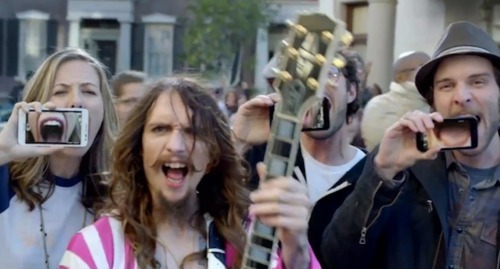Belated thoughts on the Super Bowl part 2. $4Million, the price of unremarkability
The day after the Superbowl, I read a piece from Mashable which suggested that the fact that Apple didn’t advertise was a sign of weakness. Pointing to Samsung’s spot which mocked Apple disciples lining up outside the Apple Store and invoking the legend of 1984 the writer suggests that “by not appearing at the Super Bowl, Apple is letting its competition frame the discussion”.

But we’re not living in 1984. We live in an age of ubiquitous social media (and PVR’s) where a brand’s success or failure is determined much less by its ability to buy conversation than to earn it.
I find the notion that Apple have surrendered the conversation to a rival purely because that rival bought a spot during the Super Bowl laughable. Of course, conversations about Super Bowl advertising are less likely to have featured Apple (though a surprising number did thanks to Samsung’s overt reference) but there’s a lot of conversation that happens outside of the world of advertising (as much as us ad-folks don’t often notice). In fact, a quick look at Google trends shows us that even on the day that Samsung invested millions of dollars to reach 111million Americans, Apple still enjoyed a far greater share of searches.

Rather than a sign of weakness, I would suggest that Apple’s decision not to buy a Super Bowl spot is a sign of strength. The fact is that Apple has a great brand, game-changing products and armies of advocates, means that it doesn’t need to pay over-the-odds for a Super Bowl spot to tell people about them.
In an interview with Inc. in 2008 Geek Squad founder Robert Stevens commented “Advertising is the tax you pay for being unremarkable”, that those brands unable to earn conversation must buy it. And watching the advertising that ran during the game, I couldn’t help agreeing with him. Putting aside the quality of the creative, the thing which most struck me as I watched the advertising was how unremarkable the propositions were. A procession of me-too brands, peddling generic products hoping that an expensive production could hide this.
Take Kia’s ‘dream car for real life’. Expensive production. Check. Winking, knowing Super Bowl guy clichés. Check. So far, so Super Bowl good. But don’t Adriana Lima, Motley Crue and the huge sub just serve to draw more attention to a breathtakingly average car? And doesn’t the line only serve to reinforce this?
And if Kia couldn’t find anything noteworthy to tell us about their car, spare a thought for the good people of Danone who chose the Super Bowl to tell us nothing about their Oikos Greek Yoghurt (nor entertain us, shock us, move us…). A couple enjoy a yoghurt together. All seems nice. Then Bam. She head-butts him so she can have it all to herself. And yet she doled out this potentially relationship-ending violence for a yoghurt that is only possibly the best in the world. Doesn’t seem like a very fair trade.

Don’t get me wrong. I don’t want to suggest that brands shouldn’t advertise in the Super Bowl. But the great opportunity offered by putting your brand in front of 111million people also presents a great risk. The question marketers need to ask themselves is whether they want to spend up to $4million to tell these people that their brand is unremarkable or whether they should invest that money in making it more useful, relevant, distinctive and compelling in the first place.
2 notes
ideamagpie-blog posted this
